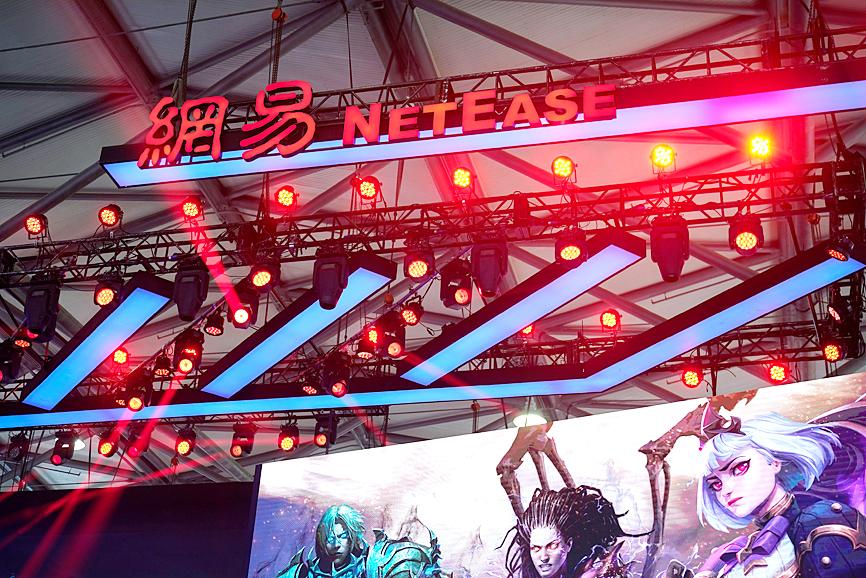Cloud Village Inc, the music streaming arm of Chinese gaming giant NetEase Inc (網易), is postponing the launch of a Hong Kong initial public offering (IPO) that was set to raise about US$1 billion, people familiar with the matter have said.
The unit tested demand for its offering last week, but is not going ahead with taking investor orders, the people said, asking not to be identified as the information is not public.
It intends to wait for better market conditions, one of the people said.

Photo: Reuters
At an expected size of about US$1 billion, Cloud Village’s IPO would be one of the biggest potential first-time share sales in Hong Kong by a technology company this year.
IFR first reported the delay yesterday. A representative for the company did not immediately respond to requests for comment.
A widening campaign by Beijing to rein in its tech and Internet sectors has spurred a sharp sell-off in Chinese technology giants from Tencent Holdings Ltd (騰訊) to Kuaishou Technology (快手).
The regulatory onslaught at one point wiped out more than US$1 trillion of market value from Chinese stocks.
Since the start of last month, Hong Kong’s Hang Seng Tech Index has shed 18 percent, while the NASDAQ Golden Dragon Index, which tracks US-listed Chinese companies, has declined 24 percent in the same period.
Cloud Village’s parent NetEase was also swept up in the selling after Chinese state media criticized the games industry, leading investors to look for the firms next in line for scrutiny.
The gaming company’s Hong Kong shares pared recent losses yesterday, advancing as much as 4.7 percent after the Cloud Village news. They have fallen about 9 percent since July 30.
Listings in the territory have slowed down sharply in the past month, due to the rocky markets as well as the usual summer lull.
Chinese electric vehicle maker Li Auto Inc (理想汽車) raised US$1.5 billion in a dual primary listing last week, but other than that there have been no major offerings since June.
The Chinese government’s efforts have resulted in most, if not all, planned US IPOs by mainland firms being put on hold. Last month, Beijing proposed new rules increasing its supervision of overseas IPOs in a move aimed at safeguarding data security.
A number of companies, like on-demand logistics and delivery firm Lalamove (貨拉拉), are considering shifting their IPOs to Hong Kong given the increasing oversight, Bloomberg News reported.
TikTok owner ByteDance Ltd (字節跳動) is reviving plans to list in Hong Kong by early next year even as Chinese authorities widen their crackdown on the country’s technology companies, the Financial Times reported.
The listing could take place either next quarter or in early next year, the paper said in a report on Sunday, citing three unidentified people with knowledge of the plans.
ByteDance has been working on addressing data security concerns raised by Chinese regulators, the paper reported.
It is going through a review process and has submitted filings to Chinese authorities, and final guidance is expected from ByteDance by next month, one of the people was cited as saying.

Zhang Yazhou was sitting in the passenger seat of her Tesla Model 3 when she said she heard her father’s panicked voice: The brakes do not work. Approaching a red light, her father swerved around two cars before plowing into a sport utility vehicle and a sedan, and crashing into a large concrete barrier. Stunned, Zhang gazed at the deflating airbag in front of her. She could never have imagined what was to come: Tesla Inc sued her for defamation for complaining publicly about the vehicles brakes — and won. A Chinese court ordered Zhang to pay more than US$23,000 in

Taiwan Semiconductor Manufacturing Co (TSMC, 台積電) yesterday said that its investment plan in Arizona is going according to schedule, following a local media report claiming that the company is planning to break ground on its third wafer fab in the US in June. In a statement, TSMC said it does not comment on market speculation, but that its investments in Arizona are proceeding well. TSMC is investing more than US$65 billion in Arizona to build three advanced wafer fabs. The first one has started production using the 4-nanometer (nm) process, while the second one would start mass production using the

‘NO DISRUPTION’: A US trade association said that it was ready to work with the US administration to streamline the program’s requirements and achieve shared goals The White House is seeking to renegotiate US CHIPS and Science Act awards and has signaled delays to some upcoming semiconductor disbursements, two sources familiar with the matter told reporters. The people, along with a third source, said that the new US administration is reviewing the projects awarded under the 2022 law, meant to boost US domestic semiconductor output with US$39 billion in subsidies. Washington plans to renegotiate some of the deals after assessing and changing current requirements, the sources said. The extent of the possible changes and how they would affect agreements already finalized was not immediately clear. It was not known

A TAIWAN DEAL: TSMC is in early talks to fully operate Intel’s US semiconductor factories in a deal first raised by Trump officials, but Intel’s interest is uncertain Broadcom Inc has had informal talks with its advisers about making a bid for Intel Corp’s chip-design and marketing business, the Wall Street Journal reported, citing people familiar with the matter. Nothing has been submitted to Intel and Broadcom could decide not to pursue a deal, according to the Journal. Bloomberg News earlier reported that Taiwan Semiconductor Manufacturing Co (TSMC, 台積電) is in early talks for a controlling stake in Intel’s factories at the request of officials at US President Donald Trump’s administration, as the president looks to boost US manufacturing and maintain the country’s leadership in critical technologies. Trump officials raised the